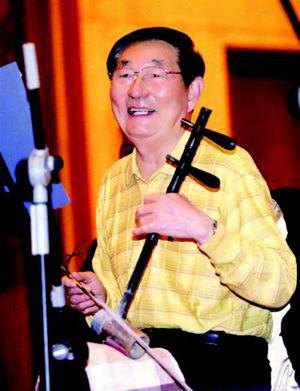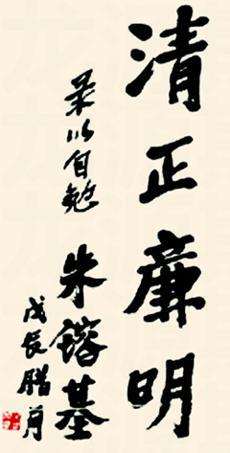The Cultural Charm of Zhu Rongji
2009-05-11XuZhongyou
Xu Zhongyou

Wu Xiaoli, a senior reporter of Hong Kong-based Phoenix TV, observes in her latest book that, of all the world state leaders she has interviewed, Zhu Rongji, the former member of the standing committee of the politburo of the CPC central committee and former Chinese premier, is a man of cultural charm.
Roots
The cultural charm comes from his familys legacy. Zhu Rongji was born on October 1, 1928 in a village of Changsha County, Hunan Province. It is said that the family was a direct branch of the 18th son of Zhu Yuanzhang, the founding emperor of the Ming Dynasty (1368-1644). Zhu Rongjis grandfather Zhu Fangxu was a provincial graduate in the 20th year of the reign of Emperor Guangxu of the Qing Dynasty (1644-1911). Zhu Rongjis father Zhu Xisheng was Zhu Fangxus youngest son. According to the family pedigree, Zhu Rongji is the 19th-generation descendent of Zhu Yuanzhang.
Zhu Xisheng died of pulmonary tuberculosis before Zhu Rongji was born. Zhu Rongjis mother died when he was nine years old. Zhu Rongjis third uncle Zhu Xuefang took the orphan under his wings.
Education was the clan tradition. The clan ran a private school in its communal compound where Zhu Rongji studied for two years until his mother passed away. The junior moved with his third uncle to a suburb of Changsha, the capital city of Hunan Province. He studied at Chongde Primary School where most subjects were similar to those studied in the late Qing Dynasty. He was totally exposed to Chinese classics as well as some new subjects.
Zhu Rongji graduated from Chongde Primary School in February, 1941 and entered the Guangyi Middle School, one of the best middle schools in the capital city of the province. It is still one of the best middle schools in Changsha today.
Zhu continued to be a brilliant student in the middle school. He graduated as the top student in his class. Zhu Rongji spent part of his primary school years and the whole of his junior middle school years in the war.

Zhu Rongji went to a senior high school in the mountainous western Hunan where Japanese troops dared not set foot and where many schools from other provinces set up their temporary camps. His academic brilliance continued. His average scores were above 98. He was even able to recite part of an English-Chinese dictionary. It was in these years in the western Hunan that he showed his talent for Peking Opera. In fact, the Zhu family had a passion for the Beijing Opera for generations. Zhu Rongjis third uncle was a versatile amateur artist of the opera and could do all jobs on and off a Peking Opera stage. Zhu Rongji saw his uncles gather together and stage a drama scene or two frequently. Influenced by his uncles, Zhu learned to sing many arias.
While studying in a senior high school in western Hunan, Zhu Rongji and his classmates staged some Peking Opera shows as entertainment for the school. They made Erhu themselves. As their first few shows were very successful, they formed an amateur troupe and decided to put on a complete show of “Empty Fort Strategy”, the story of the most popular and successful bluff in Chinese history. Zhu Rongji acted as Zhuge Liang and learned arias by imitating the arias played from a gramophone classmates managed to find. The troupe successfully staged the show.
For Zhu Rongji, the passion for Peking Opera is life long. Now in retirement since 2003, he is able to sing a lot with his wife.
Talent of Speaking to the Public
Zhu Rongjis talent of speaking in the public showed when he was a student in Qinghua University. In 1947, Zhu Rongji entered Qinghua University with a full scholarship as the number one student from Hunan Province. Academically, he was one of the best students in the department. Then he joined a revolutionary organization. He joined the CPC in 1949 and became president of the student union of the university. He was a popular president and successfully organized many events and activities. While serving as mayor of Shanghai and then the CPC chief of Shanghai in the late 1980s, he said on an occasion that he owed his capability of organizing and speaking to his being student union president in Qinghua University.
His Qinghua contemporaries were impressed by his capabilities of organizing and speaking. His colleagues were equally impressed in his later career. And journalists who attended press conferences where Zhu Rongji spoke were deeply impressed by Zhus eloquence, logic, and wisdom. Many of his answers at press conferences are like quotable quotes still vivid and fresh on the memory of many people.
Calligraphy
Since his retirement, Zhu Rongji has spent a lot of time reading and practicing calligraphy. Despite many requests for his inscriptions, he has made only eight so far in his whole career. The first was written in August, 1989 at the request of Japanese friends in the celebration of the 15th anniversary of the founding of the friendly ties between Shanghai and Osaka. Zhus inscription reads “Justice and Integrity”. Of the eight inscriptions, three were written for the State Accounting Academy. The inscriptions were the same: “Never Cook the Books”. The last was a couplet he inscribed for his cousin Zhu Jingzhi, the son of his third uncle. The request was made when Zhu Rongji was mayor of Shanghai, but it was not until September 9, 2003 that the inscription was written and presented at the celebration of the 90th birthday of Zhu Jingzhi. □
